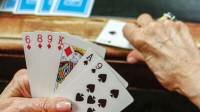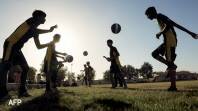If it weren’t for the national women’s team recently winning the Bridge Federation of Asia and Middle East Zonal Championship 2013 (BFAME) and its wide coverage in the international media, no one in Pakistan would be talking about bridge. It’s a strange reality that a country, which produced one of the all-time greatest bridge players in the world – Zia Mahmood – is so easily allowing the same glorious game to make its agonising death rattle.
The lack of interest might have something to do with the fact that the men’s team has not won the Bermuda Bowl, a biennial world championship tournament for national teams, since 1986. I decided to drop by the national stadium in Karachi, where one of its enclosures has been devoted to bridge since the 80s, to find out why bridge has remained in the shadows in Pakistan.
Inside the bridge hall, it’s a pretty dim affair - made more so by its insufficient tube lights, old rickety tables and lack of air conditioning. This is hardly the kind of place you’d find youngsters spending their Friday nights. But bridge has always been a game of old, intellectual, strategic thinkers: bureaucrats and generals, billionaires and chief executives. Upon entering, I was greeted by the some of the charismatic silver foxes I have ever met. Their effervescent personalities and schoolboy charms (despite their senior years) contradicts the bleak setting.
As the players slowly fill up a room of eight to ten tables, I talk to a group who have been playing for over four decades. One of them is A K Bhugri, a man who has devoted his entire life to the game and is now co-editor of Over the Bridge, the only bridge magazine in the Subcontinent.
“Online bridge has made it so convenient to play the game at home that people are less likely to come here and play,” he says. “Add to this today’s busy routines, and the obsession with technology and gadgets. People just don’t want to invest so much time in practising the game and honing their skills.”
Anwar Kizilbash, another veteran player who competed in the BFAME this year blames the dwindling popularity of the game on its lack of sponsors. “Even when I went to compete in Ahmedabad, it was a self-funded trip. On the other hand, players from other countries are not only fully supported financially, they are given incentives to practice and play.”
Kizilbash may be right when it comes to the topic of incentives: today the winner receives a very sad set of water glasses – a gift even their wives would find hard to appreciate. The people who arrange and manage these weekly meets are not paid, and do the legwork primarily for out of love for the game. Another player, Naseem Arzoo, believes that the game is dying because of a lack of initiative on both the government and the federation’s part. “There were talks about setting up a bridge university here, but even that idea fizzled out.”
One of the possible explanations for the game’s demise that all present seemed to agree on was the recent lack of transparency allegedly displayed by the Pakistan Bridge Federation. There was an invitation for two teams of 12 Pakistani players to compete in a tournament funded by a Chinese millionaire. However, Nawab Yousuf Talpur, who is the president of the Pakistan Bridge Federation, held no trials, and chose two teams (one of which included himself), without informing the board.
In turn, this led to another controversial incident at the recent regional BFAME tournament in Ahmedabad, which resulted in a “nightmarish” performance by the men’s team, tarnished the image of Pakistan and made its players look like a “bunch of palookas”. One team member decided to bring his nephew along to India on “doubtful personal data”. This led to an investigation by officials, who later asked the player and his nephew to leave the country immediately, leaving the Pakistani team one player down.
“It’s important that people who are managing the bridge affairs of this country take a serious view of this breach of the players’ code of conduct, and take stern action to deter the occurrence of such delinquencies in the future,” says Khalid Manzur, who plays bridge regularly at the stadium and is often disappointed by the unfair selection process, the desi mindset of the players, and the available talent.
“One reason why Zia stopped playing for Pakistan was apathy and the lack of seriousness of Pakistani players, against the wavelength of international players,” says Manzur. “The current crop is withering away fast, and the younger stock is too hesitant to join. Unless we can find committed players with an open mind, we will continue to languish near the bottom,” he adds.
There is no denying that the number of bridge players going six feet under every year exceeds the number of new players joining the game. Even today, there are only two relatively young players in the crowd. Tabriaz Javed and Faisal Ahsan, both in their late thirties, stand out awkwardly in this room of experienced players.
“My father used to play bridge, and that’s how my interest developed. I played for several months at home with Faisal before we ventured to the national stadium,” says Javed. “And we’re both still terrible compared to the people here, who have been playing for 30 to 40 years”, adds Ahsan laughingly.
But if Pakistan’s players are indeed mostly on the older side, then these years of experience should count for something, right? On this point, the younger pair disagree. “The problem is that the systems and methods used by the players have not evolved with time. Their performance has plateaued, and they haven’t incorporated any of the latest scientific bidding methods,” says Ahsan.
Both agree that if the two of them had less hectic work schedules and older children, and played as much as some of these older players do, they would surely be ahead of the curve. When asked why they don’t bring more of their friends here, “Bridge is a mind sport – it’s not a game for everyone! But anyone who truly understands the game realises how beautiful it is,” says Javed.I may have once dismissively read Warren Buffet’s quote “I wouldn’t mind going to jail if I had three cellmates who played bridge,” but hearing the word beautiful and bridge uttered in the same sentence wasn’t something I was prepared for.
However, as soon as the game begins and I watch the players in action, the beauty in bridge becomes more apparent. After all, bridge has been playing a role in bringing people from diverse backgrounds together in Karachi for many years. The way the player’s eyes light up when they talk about the game, and laughter that erupts every five minutes from a different corner. Group emails are exchanged between meets, discussing and analysing each other’s moves. The way the group bonds together when one of the players passes away shows that this is a close-knit family.
The players may have their disagreements now and then, and enough drama to rival a Star Plus soap opera, but this game still manages to foster a sense of companionship, loyalty and entertainment at a time when wives have passed on and children have moved abroad. Men who have lived incredible lives, but have since been forgotten by the world find an identity here – a place where they belong.
These men are loyal to each other but even more so to the game. Here’s hoping the authorities show what’s left of this intellectual community some loyalty.
The writer is a journalist based in Karachi.























